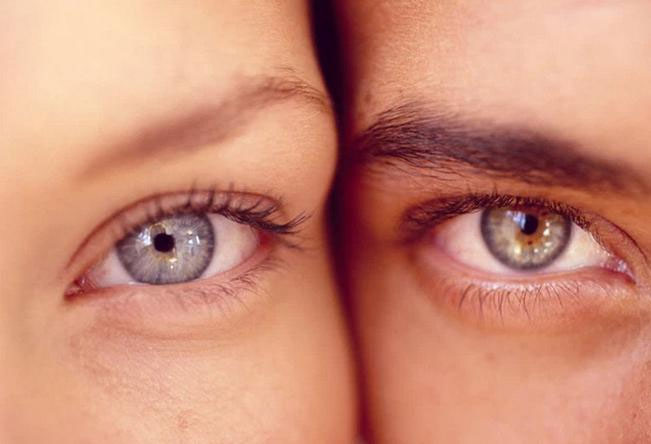Interesting things around your eye color
You know, everyone has a different eye color that makes up their facial features, while some people have black eye color, others have blue, green or brown. The part that contains the color of your eyes is called the iris, here's what you should know around your eye color.
How to determine eye color?
We used to believe that children's eye color could be predicted by looking at the eyes of their parents and grandparents. Besides, according to science, brown eyes is a dominant trait and blue is a recessive trait, you can also know clearly what eye color your child will be born with.
However, modern science proves that a person's eye color is contributed by many different genes rather than a single gene, although genetic factors still play an important role and the color of a child's eyes. Children don't rely solely on their parents' eyes.
Eye color is a result of the amount and distribution of the pigment melanin in your irises, brown eyes are more pigmented than blue. Dark eyes tend to be more dominant, for example, parents with both brown eyes are more likely to have the same eye color at birth, but due to different genes, this is not the case. is always true, for example, if one of the parents has brown eyes and the other has blue eyes, then the child is not necessarily born with brown eyes.

A person's eye color is contributed by many different genes.
According to research, about half of the population in the US has brown eyes, brown eye color is also common in warm climates around the world. People with blue eyes usually don't have pigment in the stroma, the front layer of the iris. The lack of pigment in the eye causes the eye to appear blue due to the scattering of incoming light.
People with green eyes are very rare, making up only about 2% of the world's population, a type of eye color that comes from both the distribution of melanin and the effects of scattering light.
People with congenital albinism often have little or no melanin in their bodies, so they often have light blue eyes and, in rare cases, pink or red.
Can human eye color change over time?
Human eye color can change from birth, for example, babies born with blue eyes can still change color later when melanin develops in the lining. From the time a child is about 1 year old or later, the child's eye color will remain the same until adulthood.
Eye color changes are rare, they can happen when your pupils dilate, but are caused by pigments in the iris combining or dispersing. When people are in puberty or pregnancy, or in the later years of life, eye color can turn darker.
Health problems that can affect eye color
Health problems will also affect your eye color, such as:
Injuries to the eye: the damage to the iris will gradually lead to a color change.
Neurofibromatosis is an inherited disorder of the nervous system that causes small tumors to grow on nerve cells throughout the muscle, including small nodules in the black of the eye. These tumors are usually harmless and don't affect vision, but they can change the color of your eyes.
Uveitis is the medical term used to refer to a group of inflammatory diseases that cause swelling of the eye, it both affects vision, at worst can lead to blindness and also leads to changes in normal color. of the eye.
Fuchs heterochromic vasculitis (FHI) is a chronic form of uveitis that leads to iris atrophy, cataracts, and eye inflammation. Another consequence is loss of pigment in the eye, changing the color of one eye, creating heterochromia or producing different colors in both eyes.
Horner's syndrome: a fairly rare condition that occurs due to a stroke or spinal cord injury that damages the facial nerve. Symptoms include pupillary constriction, drooping eyelids, and unilateral sweating disturbances, along with decreased pigmentation in the iris, causing the color of the eye to change.
Cataract: although not affecting the iris, but can make the eye color cloudy, this disease is common in older people and affects vision. Subtle cataracts can be treated with surgery, according to research, people with dark eyes have a higher risk of developing cataracts than others.
- Interesting things about the eyes
- 10 interesting things about life you may not know
- 10 interesting things about nature you may not know
- Going from one surprise to the other is different from the interesting things about all things
- Super interesting things about math you will definitely fall back
- 13 surprisingly interesting things about urine
- 12 horrible things about China you may not know
- Animal World - Interesting things you don't know
- 10 interesting things about cats
- 10 interesting things about the Internet that you don't know
- Discover interesting things about rain
- Is color blindness an esper power associated with trade-offs?
 The truth about the mysterious red-haired giant at Lovelock Cave
The truth about the mysterious red-haired giant at Lovelock Cave Inunaki Tunnel: The haunted road leading into Japan's 'village of death'
Inunaki Tunnel: The haunted road leading into Japan's 'village of death' The mystery of the phenomenon of human reflection before dying
The mystery of the phenomenon of human reflection before dying 6 mysterious phenomena, although science has been developed for a long time, still cannot be answered
6 mysterious phenomena, although science has been developed for a long time, still cannot be answered